Uncategorized
An amended Conservative Jewish Passover policy taps into the booming gluten-free market
(JTA) — Ahead of Passover 2020 — as life worldwide ground to an abrupt halt in the face of a rapidly spreading pandemic and people faced the specter of empty grocery shelves, or staying confined at home — a range of rabbis tried to make it a little easier to observe the holiday.
Long lists of foods and newly lenient guidelines from Jewish organizations circulated among people who keep kosher for Passover, explaining which foods they could purchase and eat on the holiday, given the year’s extraordinary circumstances. The message — sometimes explicit, sometimes implied — was that these special permissions applied only temporarily.
Now, one rule instituted as a COVID provision by the Conservative movement is becoming permanent: Before Passover begins, Jews may buy certified kosher products that have kosher-for-Passover ingredients and are certified gluten-free and oat-free — even if they aren’t explicitly certified kosher for Passover.
When it first appeared in 2020, that rule was written in a way that suggested it was an emergency measure, using the words “when the situation demands.” This year, that four-word phrase has been removed from the Rabbinical Assembly’s Passover guide, and the guidance has moved from a separate section into the main list of allowable products.
The edit reflects how some shifts in Jewish practice that first appeared at the outset of the pandemic, as stopgap measures, have since been normalized. It also allows — for at least a narrow set of Jews who observe Jewish ritual in accordance with the Conservative movement’s dictates — more robust and potentially less expensive options for keeping kosher during Passover.
Rabbi Aaron Alexander, chair of the Kashrut Subcommittee on the Conservative movement’s Committee on Jewish Law and Standards, which issues the movement’s Jewish legal rulings, said the change does not reflect a shift in the movement’s approach to Jewish law, known as halacha. Instead, he said, it reflects confidence that the Food and Drug Administration’s strict rules about how products can be labeled can be trusted when it comes to Passover observance.
“It’s not a significant change in how we understand halacha in general and how we understand the general Passover laws,” Alexander said. “It’s always been the case that there are products you can buy without a KP [symbol] before Passover, when you can be pretty sure that there’s no chametz and that any accidental admixture would be minimal.”
The requirement for foods to be certified gluten-free and oat-free, Alexander said, is “an extra line of defense” for people buying products before Passover that are not explicitly labeled kosher for Passover.
The policy shift opens new doors to kosher-keeping Jews: Rather than seeking out specialty items with Passover kosher certification, often carried only in kosher supermarkets and in major markets, they can observe Passover by taking advantage of the increasing number of products that are labeled kosher, gluten-free and oat-free, as long as the ingredients accord with Passover laws.
The gluten-free marketplace is estimated at $6 billion a year in the United States and is growing by an estimated 10% each year, according to industry trend reports. The marketplace serves people with celiac disease — whose incidence is rising — as well as people who seek to reduce or eliminate their gluten intake for perceived health reasons.
Some people with celiac disease say they look forward to Passover because more products will hit shelves that they can count on to be free of gluten. Now, Jews who follow the Conservative movement’s guidance can benefit from some of the wide array of gluten-free foods that are already available.
On Passover, five types of grain are prohibited (except for when they are used to make matzah): wheat, spelt, barley, oat and rye. By purchasing products that are certified gluten-free and oat-free, consumers can avoid buying food that contain those five ingredients.
“In an effort to definitively alert consumers to the presence of wheat gluten in packaged foods, the FDA mandates that any product including the words ‘gluten-free,’ ‘no gluten,’ ‘free of gluten,’ or ‘without gluten’ must contain less than 20 parts per million of glutinous wheat, spelt, barley, or rye,” a footnote to the guide states. “This eliminates the possibility of a gluten-free packaged food containing 4 of the 5 hametz-derived grains in any quantity that would be viable according to Jewish law.”
Alexander emphasized that the gluten-free and oat-free guidance should be seen as “a good way to figure out whether or not the products you’re getting before Passover could be problematic.” He cautioned that looking at the rest of the ingredients is crucial: Some certified gluten-free products, for example, could still be prohibited for Passover because they contain yeast.
Sarah Chandler, an ordained Hebrew priestess and Jewish educator who used to run a pickle business, already bought food with gluten-free labels during her pre-Passover shopping.
“It’s very practical, and it’s also consistent with other levels of kashrut,” Chandler told JTA regarding her pre-Passover shopping. “The fact that you and I can go to a grocery store and buy eggs — you don’t need a kosher symbol on it. We just know that it’s eggs. We’re not worried that the egg is from a bird of prey and not kosher. We can just assume that [if] it says ‘chicken eggs,’ they’re chicken eggs.”
She added, using a Hebrew term for kosher certification, “We don’t need a hechsher on it. The hechscher just means a certain level of supervision.”
Chandler is a vegetarian and eats a variety of nut butters, which are often expensive. Recently, she bought a jar of gluten-free cashew butter that was on sale for $6 instead of its regular price $12. (A jar of almond butter by a kosher brand marketed for Passover can run around $18.) Because it’s still unopened and the ingredients are kosher for Passover, she plans to eat it during the holiday.
Kosher-keeping Jews with gluten intolerance and celiac disease have especially found a lifeline in the growing marketplace of gluten-free food.
Lisa Goldman, also known as the “Gluten Free Jewish Momma,” is an Orlando-based advocate for the gluten intolerant on behalf of her now-grown daughter, who was diagnosed with celiac disease in 2012.
“My daughter was crying over not being able to have matzah balls because matzah [is] very high in wheat,” Goldman recalled. “So it was so exciting when all of the Jewish brands started to come out with a gluten-free version of many of their products.”
By the Way Bakery, a kosher, gluten-free and dairy-free bakery in New York City founded in 2011 by Helene Godin, may be a destination where Jewish shoppers who abide by the Conservative ruling could get food for the holiday. It is offering multiple Passover items this year, though the menu isn’t certified kosher for Passover.
By the Way Bakery is certified kosher, and its individual products that are sold in Whole Foods are in the process of being certified gluten-free.
“I’m really careful with the word ‘certified,’” Godin told JTA. “We are not certified with respect to Passover. I can tell you what is in [our products]. We’re very transparent. If you go to our website and you go to the FAQ section, there’s a link to our ingredient summary. And we list everything that’s in every product.”
Some of the items on this year’s Passover menu include an orange almond cake that Godin calls “the little black dress of desserts” because it goes with everything, and a chocolate truffle torte. By the Way Bakery’s cakes and cookies are made with wheat flour alternatives, many of which fall into the category of kitniyot, or foods such as legumes, corn, and rice that some Jews, including many Ashkenazim, avoid eating on Passover. Sephardic Jews traditionally eat kitniyot on the holiday and the Conservative Movement began permitting the consumption of kitniyot during Passover in 2016.
“There are people who say, ‘You’re not kosher enough,’” Godin said. “And there are people who say, ‘Oh, I’ll eat that.’”
Another popular gluten-free kosher bakery, Modern Bread and Bagel, is offering non-kitniyot foods for Passover. Like By the Way Bakery, Modern Bread and Bagel is not certified kosher for Passover, but all of its kitchen’s ingredients are kosher for Passover.
Godin says her company gains new customers every Passover, but this year has been an especially busy time. The number of orders for the orange almond cake, which has not been on the menu in several years, was three or four times larger than what she expected.
“Our projections were that we would be up 20% over last year. And we’ve well exceeded that,” she said. “Post-COVID, people just want to celebrate and get together.”
—
The post An amended Conservative Jewish Passover policy taps into the booming gluten-free market appeared first on Jewish Telegraphic Agency.
Uncategorized
A border official mocked an attorney for observing Shabbat. Orthodox lawyers say the issue is not new.
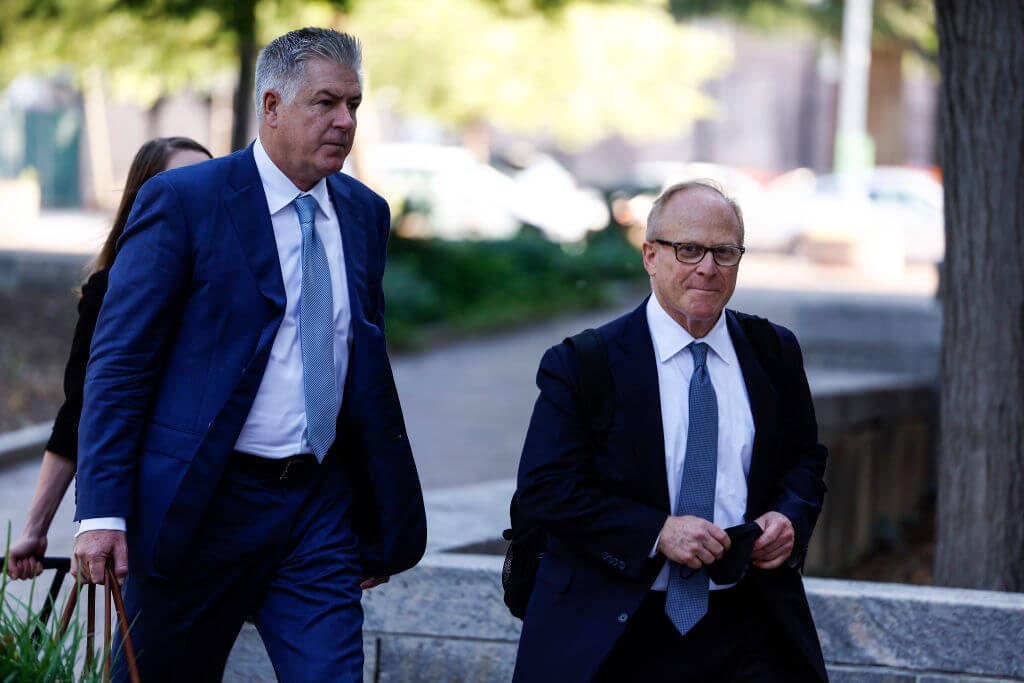
Gregory Bovino, the Border Patrol official who led immigration raids in Minneapolis, reportedly mocked the Jewish faith of Minnesota’s U.S. attorney during a phone call with other prosecutors in mid-January. According to The New York Times, Bovino complained that Daniel Rosen, an Orthodox Jew, was hard to reach over the weekend because he observes Shabbat and sarcastically pointed out that Orthodox Jewish criminals don’t take the weekends off.
The call took place at a moment of extreme tension in Minneapolis, as federal agents under Bovino’s command carried out an aggressive immigration crackdown that had already turned deadly. It came between the fatal shootings of Renée Good and Alex Pretti, both killed during enforcement operations, and amid fierce backlash from local officials and residents.
Bovino made the remarks in a derisive, mocking tone, the Times reported, casting Shabbat observance as a point of ridicule. Bovino had already drawn national attention for frequently wearing an olive double-breasted greatcoat with World War II-era styling, leading some critics to call him “Gestapo Greg” and accusing him of “Nazi cosplay.” Bovino, who pushed back on those comparisons, has since been reassigned.
Rosen, a Trump nominee, was confirmed as Minnesota’s U.S. attorney in October 2025 after a career in private practice and Jewish communal leadership. He has said that rising antisemitism helped motivate his decision to take the job, and that prosecuting hate crimes would be a priority for his office.
For many Orthodox Jewish lawyers, Bovino’s alleged remarks were not surprising. They echoed a familiar challenge: explaining that Shabbat — a full day offline — is not a lack of commitment, but a religious boundary that cannot be bent without being broken.
In a profession that prizes constant availability, that boundary can carry consequences. Some lawyers say it shows up in subtle ways: raised eyebrows, jokes about being unreachable, skepticism when they ask for time off. Others say it has shaped much bigger decisions, including how visibly Jewish they allow themselves to be at work.
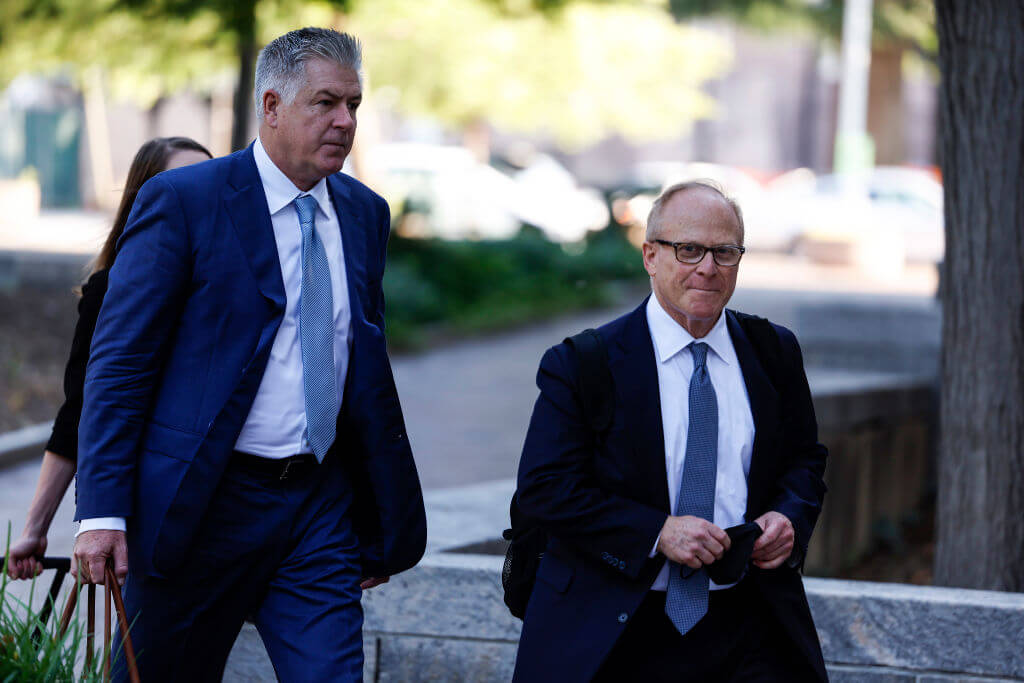
David Schoen, an Orthodox criminal defense attorney who served as lead counsel for President Donald Trump during his second impeachment trial, said he has long been mindful of how religious observance is perceived in the courtroom.
“I have made a conscious decision not to wear my yarmulke in front of a jury,” Schoen said, explaining that jurors often “draw stereotypes from what they see.”
Those concerns were reinforced by experience. Schoen said he has noticed a “definite difference in attitude” from some judges depending on whether he wore a yarmulke. In one case, he recalled, a Jewish judge pulled him aside during a jury trial and told him she thought he had made the right choice — a comment Schoen said he found disappointing.
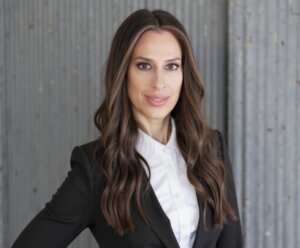
For Sara Shulevitz, a criminal defense attorney and former prosecutor, the Bovino episode brought back memories from early in her career.
Orthodox and the daughter of a Hasidic rabbi — now married to one — Shulevitz said her unavailability on Jewish holidays was often treated as a professional flaw rather than a religious obligation. “It held me back from getting promotions,” she said.
In court, the scrutiny could be blunt. “I was mocked by a Jewish judge for celebrating ‘antiquated’ Jewish holidays,” she said, recalling requests for continuances for Shemini Atzeret and Simchat Torah. In another case, she said, a judge questioned her request for time off for Shavuot and suggested she had already “taken off for Passover.”
When another judge assumed Passover always began on the same day in April, “I had to explain the Jewish lunar calendar in the middle of court while everyone was laughing,” she said.
Not every encounter, Shulevitz added, was rooted in hostility. Sometimes judges simply didn’t understand Orthodox practice. When she explained she couldn’t appear on a Jewish holiday, judges would suggest she join the hearing by Zoom — forcing her to explain that Orthodox Jews don’t use electrical devices on Shabbat or festivals.
The misunderstanding often slid into a familiar assumption. “They think you’re lazy,” she said. “It’s not laziness. Any Jewish woman knows how much work goes into preparing for Passover.”
Rabbi Michael Broyde, a law professor at Emory University who studies religious accommodation, said that Bovino’s alleged “derogatory remarks” are “sad and reflects, I worry, the antisemitic times we seem to be living in.”
He added that the criticism of Rosen reflected a basic misunderstanding of how law offices operate, calling it “extremely rare” for a lawyer’s religious practices to interfere with their obligations, especially when senior attorneys delegate work and courts routinely grant continuances.
“No one works 24/7,” Broyde said.
The episode echoed a similar Shabbat-related incident during Trump’s first term. In his 2022 memoir, former Trump trade adviser Peter Navarro described how a group sought to undermine Trump son-in-law Jared Kushner’s role in the 2020 campaign by scheduling a key White House meeting with Trump on a Saturday, knowing Kushner — who is Shabbat observant — would not attend. Navarro titled the chapter recounting the episode, “Shabbat Shalom and Sayonara.”
The tension between Jewish observance and public life is not new. Senator Joe Lieberman, the first observant Jew to run on a major-party presidential ticket, famously walked to the Capitol for a Saturday vote and ate fish instead of meat at receptions. His longtime Senate colleague Chris Dodd joked that he became Lieberman’s “Shabbos goy.”
Still, Schoen said, visibility can cut both ways. During Trump’s impeachment trial, while speaking on the Senate floor, he reached for a bottle of water and instinctively paused. With one hand holding the bottle, he used the other to cover his head — a makeshift yarmulke — before drinking.
The moment was brief, but it did not go unnoticed. In the days that followed, Schoen said he heard from young Jewish men and businesspeople who told him that seeing the gesture made them feel more comfortable wearing their own yarmulkes at work.
The attention, he said, was unexpected. But for some in the Orthodox community, it became a source of pride.
“I felt honored,” Schoen said.
My guess in all seriousness is that he normally wears a yarmulke and this was reflex. Schoen is modern Orthodox so that would make sense. But I defer to @jacobkornbluh https://t.co/MkKx6W03v2
— Jake Tapper 🦅 (@jaketapper) February 9, 2021
Jacob Kornbluh contributed additional reporting.
The post A border official mocked an attorney for observing Shabbat. Orthodox lawyers say the issue is not new. appeared first on The Forward.
Uncategorized
Deni Avdija becomes first Israeli to be selected as an NBA All-Star
(JTA) — Portland Trail Blazers star Deni Avdija’s meteoric rise has officially reached a new stratosphere, as the 25-year-old forward has become the NBA’s first-ever Israeli All-Star.
Avdija was named an All-Star reserve for the Western Conference on Sunday, an expected but deserved nod after the northern Israel native finished seventh in All-Star voting with over 2.2 million votes, ahead of NBA legends LeBron James and Kevin Durant. Avdija’s breakout performance this season has earned him repeated praise from James and others across the league.
Avdija’s star turn began last year in his first season with Portland, when he further captured the adoration of Jewish fans across Israel and the U.S. But he took another step forward this season, averaging 25.8 points, 6.8 assists and 7.2 rebounds per game. His points and assists clips are by far the best of his career, and rank 13th and 12th in the NBA, respectively. He’s considered a front-runner for the league’s Most Improved Player award.
For close observers of Israeli basketball, Avdija’s All-Star selection is the culmination of a promising career that began as a teenage star with Maccabi Tel Aviv and made him the first Israeli chosen in the top 10 in an NBA draft.
“Deni Avdija being named an NBA All-Star reserve is an unbelievable achievement in the mind of every Israeli basketball fan,” Moshe Halickman, who covers basketball for the popular Sports Rabbi website, wrote in an essay for the Jewish Telegraphic Agency. “This is a dream come true for many — a dream that became realistic and even a must-happen during his breakout season — but something that in his first five seasons in the NBA never came across as something that was going to be real.”
Halickman, who has covered Avdija in Washington, D.C., and in Israel, wrote that Avdija is not only considered the greatest Israeli hooper of all time, but perhaps the best athlete to come out of Israel, period.
Oded Shalom, who coached Avdija on Maccabi Tel Aviv’s Under-15 and Under-16 teams, echoed that sentiment in a recent profile of Avdija in The Athletic.
“Even though he is only 25, I think he is Israel’s most successful athlete in history,’’ Shalom said. “We’ve had some great gymnasts — and I hope everyone forgives me for saying it, because we’ve had some great athletes — but I think Deni has become the greatest.”
Avdija’s ascension has also come against the backdrop of the Gaza war and a reported global rise in antisemitism, which he has said affects him personally.
“I’m an athlete. I don’t really get into politics, because it’s not my job,” Avdija told The Athletic. “I obviously stand for my country, because that’s where I’m from. It’s frustrating to see all the hate. Like, I have a good game or get All-Star votes, and all the comments are people connecting me to politics. Like, why can’t I just be a good basketball player? Why does it matter if I’m from Israel, or wherever in the world, or what my race is? Just respect me as a basketball player.”
Now, Avdija’s talents will be on display at the NBA All-Star Game, on Sunday, Feb. 15, in Los Angeles.
The post Deni Avdija becomes first Israeli to be selected as an NBA All-Star appeared first on The Forward.
Uncategorized
Democratic leader says GOP-led Congress boosted ICE funding while Jewish security is underfunded
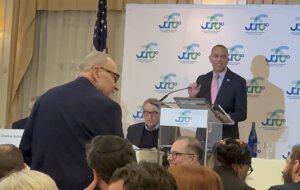
House Democratic Leader Hakeem Jeffries used a Jewish gathering in New York on Sunday to spotlight what he described as an imbalance in federal priorities, building on outrage over the Trump administration’s violent crackdown in Minneapolis that resulted in two fatal shootings.
Jeffries criticized the Republican-controlled Congress for boosting immigration enforcement funding by billions while, he said, security funding for Jewish institutions continues to lag amid rising antisemitic threats. He said that in the One Big Beautiful Bill Act, which passed last July and included cuts to Medicaid, the Department of Homeland Security received an additional $191 billion, including $75 billion for ICE.
“If that can happen, then the least that we can do is ensure that this vital security grant program is funded by hundreds of millions of dollars more to keep the Jewish community and every other community safe,” Jeffries said.
The Nonprofit Security Grant Program, established by Congress in 2005 and administered by FEMA under the Department of Homeland Security, provides funding to nonprofits, including houses of worship, to strengthen security against potential attacks. Congress began significantly increasing funding in 2018 after a wave of synagogue attacks nationwide, bringing the program to $270 million today.
Major Jewish organizations are pushing to raise funding to $500 million amid rising antisemitic threats. Last year, the Trump administration briefly froze the program as part of broader agency cuts, and some groups have been reluctant to apply because applicants must affirm cooperation with federal immigration enforcement.
Jeffries said House Democrats strongly support an increase to $500 million annually to meet escalating security needs. “It’s got to be an American issue, because that is what combating antisemitism should be all about,” he said.
The breakfast, previously held at the offices of the UJA-Federation of New York, was held this year for the first time in the events hall at Park East Synagogue, which was the site of a pro-Palestinian protest last year that featured antisemitic slogans and posters.
Sunday’s program also included remarks from Senate Minority Leader Chuck Schumer, who told the audience that his support for Jewish security funding will only continue growing under his leadership, calling it his “baby.”
“As long as I’m in the Senate, this program will continue to grow from strength to strength, and we won’t let anyone attack it or undo it,” Schumer said.
Rep. Jerry Nadler, the co-chair of the Congressional Jewish Caucus who is retiring at the end of the year after 36 years in the House, also spoke at the event. Nadler, like several other Democrats in recent months, compared the actions of ICE agents to the Gestapo, Nazi Germany’s secret police. The comparison has drawn sharp criticism from Democrats, Republicans and Jewish leaders.
Support for Israel aid
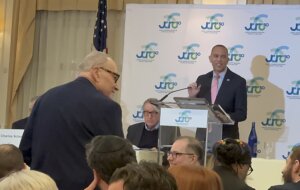
Both Schumer and Jeffries vowed in their remarks to continue supporting U.S. military assistance to Israel, amid increasing calls within the party for sharper opposition to Israel. Polls show that Democratic voters are increasingly sympathetic to Palestinians. In July, a record 27 Senate Democrats, a majority of the caucus, supported a pair of resolutions calling for the blocking of weapons transfers to Israel.
“I think it’s the humane thing to do to ensure that Israel has a right to exist as a Jewish and democratic state and eternal homeland for the Jewish people,” Jeffries said. The House Minority Leader, who has cultivated close ties with Jewish leaders since his election in 2012, noted that he has visited Israel nine times. He recalled that on his recent trip, Israel’s ambassador to the U.S., Yechiel Leiter, joked that it might be time for Democrats to buy property in Jerusalem.
Schumer, the nation’s highest-ranking Jewish elected official, has seen his popularity decline and has faced calls to step down from his role as leader. On Sunday, he pledged that he “will always fight to give Israel what it needs to protect itself from the many who want to wipe Israel off the face of the map.”
The post Democratic leader says GOP-led Congress boosted ICE funding while Jewish security is underfunded appeared first on The Forward.


